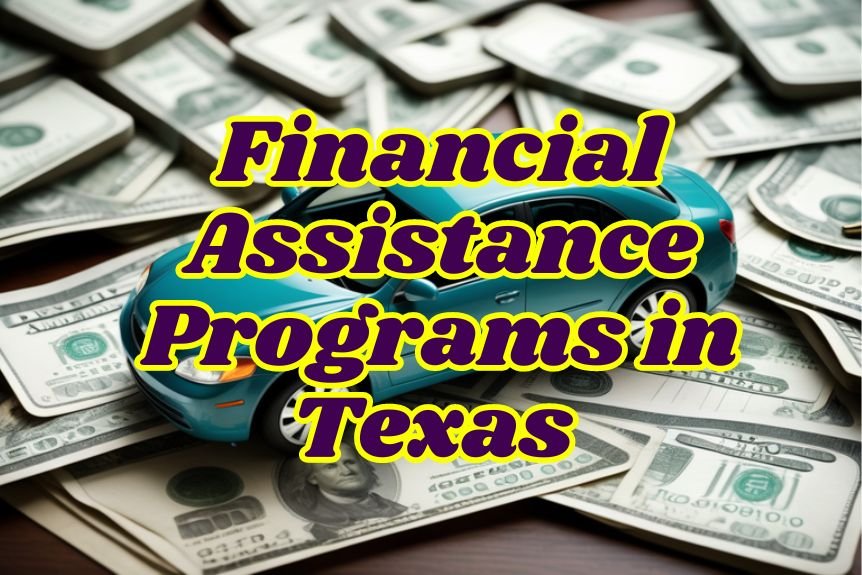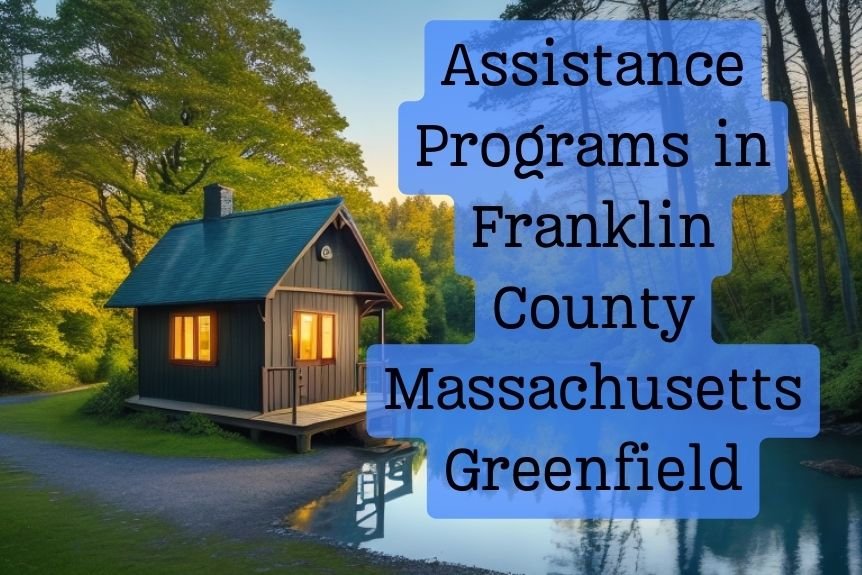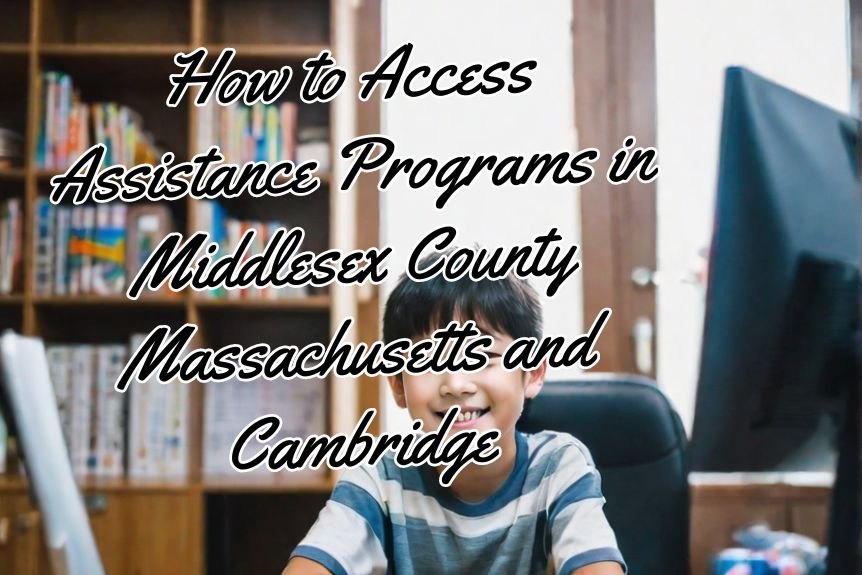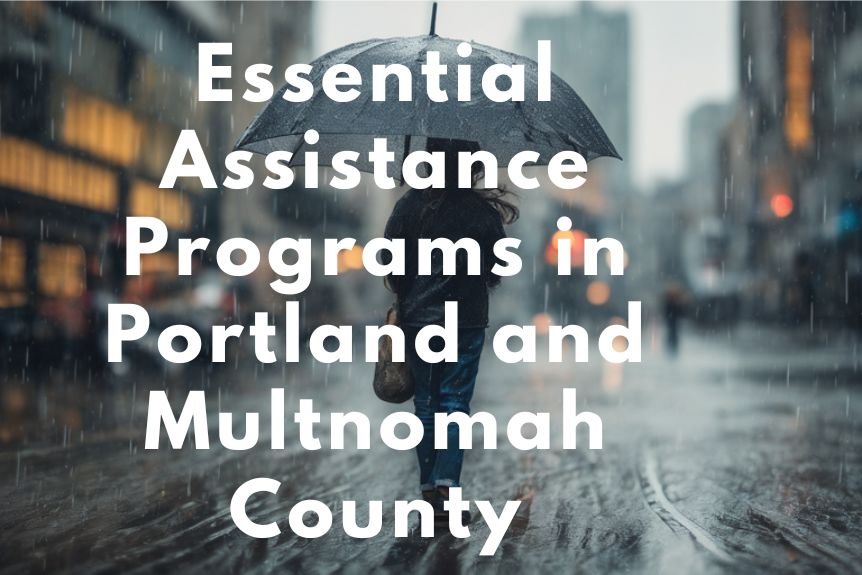If you’re navigating the financial landscape of Massachusetts, imagine these top 10 financial assistance programs as a beacon of hope in the stormy sea of economic uncertainty.
From housing assistance to educational funding options, each program stands as a pillar of support for those in need.
As you explore the diverse range of aid available, discover how these programs could potentially redefine your financial outlook and provide a much-needed lifeline during challenging times.
Housing Assistance Programs

When seeking housing assistance programs in Massachusetts, navigating the eligibility criteria and application process can be crucial for securing vital support. The state offers various rental assistance programs to aid individuals and families in need.
Emergency Aid to Elders, Disabled, and Children (EAEDC) provides cash grants to eligible individuals facing financial hardship. The Massachusetts Rental Voucher Program is another key initiative that offers rental assistance to qualifying households, helping them afford suitable housing.
Additionally, Transitional Assistance (DTA) programs like Transitional Aid to Families with Dependent Children (TAFDC) cater to families with dependent children who require housing support. These programs aim to ensure that vulnerable populations have access to safe and stable housing options.
Food Assistance Programs
Food assistance programs in Massachusetts are essential resources that help address the nutritional needs of low-income individuals and families, ensuring access to vital sustenance.
SNAP, known as the Supplemental Nutrition Assistance Program, plays a crucial role in assisting low-income residents in affording food and groceries.
WIC, or the Special Supplemental Nutrition Program for Women, Infants, and Children, not only provides nutritious foods but also offers nutrition education and healthcare referrals to eligible participants.
The Pandemic-EBT program offers additional food benefits to families with children who’d have received free or reduced-price meals at school, aiding in food security during challenging times.
Food banks and distribution centers across Massachusetts play a significant role in assisting individuals facing food insecurity by providing free food and groceries.
Additionally, the Good Neighbor Energy Fund in Massachusetts supports low-income households by helping them with energy expenses, ensuring they can afford heating and electricity.
These programs collectively contribute to alleviating food and energy-related financial burdens for those in need.
Utility Bill Assistance

When seeking utility bill assistance in Massachusetts, you should be aware of the eligibility requirements, application process details, and available funding sources. Understanding these points is crucial for accessing financial aid to cover home energy expenses and prevent service interruptions.
Eligibility Requirements for Utility Aid
Eligibility criteria for utility bill assistance programs in Massachusetts primarily hinge on income levels, household composition, and adherence to specific program guidelines. When considering if you qualify for utility aid, keep in mind the following:
- Income Eligibility: Different programs have varying income eligibility limits, targeting low-income households struggling with energy costs.
- Household Composition: Some assistance programs prioritize vulnerable populations like seniors, individuals with disabilities, and families with young children.
- Documentation Requirements: Applicants may need to provide proof of income, utility bills, and residency to qualify for aid.
Understanding these factors can help you determine your eligibility and access the support needed to manage your energy expenses efficiently.
Application Process Details
To initiate the process of applying for utility bill assistance in Massachusetts, you’re encouraged to contact your local Community Action Agency or visit the state’s Energy Assistance Program website.
Eligibility for financial assistance with utility bills is determined based on factors such as income, household size, and energy costs, with a focus on vulnerable populations like seniors, disabled individuals, and families with young children.
The Low Income Home Energy Assistance Program (LIHEAP) in Massachusetts offers aid to eligible households to help cover heating and cooling expenses. Programs may provide one-time grants, discounts, or payment plans to support residents struggling to pay their energy bills.
The application process typically involves submitting income documentation, utility bills, and other necessary information for eligibility assessment.
Available Funding Sources
If you’re seeking financial assistance for utility bills in Massachusetts, understanding the available funding sources is crucial for accessing support. When facing financial hardships, vulnerable households can benefit from programs like the Low Income Home Energy Assistance Program (LIHEAP) and the Good Neighbor Energy Fund. These initiatives specifically target heating and electricity bills, ensuring that essential services remain accessible to those in need.
Additionally, utility assistance programs across Massachusetts work to prevent disconnections for households struggling to cover utility expenses. By utilizing these resources, individuals and families can navigate through tough times with the necessary support to maintain crucial utility services.
Medical Expense Support
Medical expense support in Massachusetts encompasses various programs designed to assist individuals in covering their healthcare costs, ensuring access to essential medical services.
The Health Safety Net Fund (Free Care) provides financial assistance for low-income patients, ensuring they receive necessary medical treatment.
Non-emergency medical transportation services are available for seniors, facilitating their access to medical care appointments.
Dental care programs offer free or low-cost services to individuals in need of dental treatment, promoting oral health in the community.
Community health centers play a crucial role in providing uninsured individuals with access to affordable medical care, ensuring they receive necessary healthcare services.
Additionally, prescription assistance programs aim to alleviate the financial burden of medications for those facing economic challenges, enabling individuals to afford essential medications for their well-being.
These programs collectively contribute to enhancing healthcare accessibility and affordability for individuals in Massachusetts.
Employment & Training Services

When considering Massachusetts’ employment and training services, you’ll find they encompass job placement assistance, skills training programs, and career guidance services.
These programs are tailored to aid individuals in developing the necessary competencies for successful employment.
Job Placement Assistance
In Massachusetts, individuals seeking employment can benefit from job placement assistance provided through Employment & Training Services. These programs offer a range of resources and support to help job seekers enhance their skills and secure meaningful employment opportunities. Here are three key aspects of job placement assistance in Massachusetts:
- Career Counseling:
Job placement assistance programs in the state provide personalized career counseling services to help individuals identify their strengths, interests, and career goals.
- Resume Building and Interview Preparation:
Employment & Training Services offer guidance on creating effective resumes, cover letters, and interview techniques to increase job seekers’ chances of securing employment.
- Job Search Assistance:
Individuals can access job placement assistance to receive job referrals, explore job opportunities, and access valuable resources for career advancement.
Skills Training Programs
To further enhance your employment prospects and bridge the gap between job seekers and employers, Skills Training Programs offered through Employment & Training Services in Massachusetts focus on providing specialized training to develop specific skills needed in current job markets. These programs offer job seekers opportunities to acquire vocational training, apprenticeships, and on-the-job training to prepare for employment opportunities.
By focusing on in-demand skills, individuals can advance their careers and secure positions in various industries. The goal of these skills training programs is to equip individuals with the necessary tools to succeed in the workforce, ultimately facilitating career advancement and job placement.
Through these initiatives, job seekers can enhance their employability and meet the requirements of today’s competitive job market.
Career Guidance Services
Career Guidance Services provided by Employment & Training Services in Massachusetts equip individuals with essential tools and resources to navigate the job market successfully and pursue career advancement opportunities. These services offer a range of support, including:
- Job Search Assistance: Helping individuals with resume building, interview preparation, and strategies for finding employment.
- Vocational Education: Providing access to training programs and educational opportunities tailored to specific career paths.
- Employment Specialists: Offering personalized guidance, skill assessments, and assistance in navigating job placement opportunities.
Through Career Guidance Services, individuals can explore career paths, identify transferable skills, and set goals to enhance their prospects in the workforce.
Childcare Subsidies
Financial stability is crucial for low-income families in Massachusetts seeking childcare subsidies to ensure their children receive quality care while parents work.
Childcare subsidies in Massachusetts offer financial assistance to low-income families, easing the burden of daycare services’ costs. Eligibility for these subsidies is determined by income level and family size, aiming to support those most in need.
By covering a portion of childcare expenses, these subsidies make it more feasible for families to access quality care for their children. The primary goal of childcare subsidies is to assist working parents in maintaining employment while guaranteeing that their children receive appropriate care and supervision.
This financial assistance plays a vital role in promoting the well-being of both children and parents, ensuring that families facing financial challenges can still provide a safe and nurturing environment for their kids while pursuing their careers.
Transportation Assistance Programs

Navigating the challenges of low-income families seeking childcare subsidies in Massachusetts, the state also offers transportation assistance programs to enhance accessibility for essential daily activities. These programs cater to the needs of low-income individuals by providing them with affordable transportation options. Here are three key aspects of transportation assistance programs in Massachusetts:
- Reduced Fares: Eligible recipients can benefit from reduced fares on various public transportation modes such as buses, subways, and commuter rail services. This reduction in fares makes commuting more affordable for individuals facing financial constraints.
- Access to Essential Destinations: Transportation assistance programs offer discounted or free transportation passes to help individuals commute to work, school, medical appointments, and other vital destinations. This access ensures that individuals can meet their daily needs without incurring high transportation costs.
- Increased Mobility: By providing affordable transportation options, these programs aim to increase mobility and accessibility for low-income individuals in Massachusetts. Reliable transportation plays a crucial role in enabling individuals to lead productive lives and access necessary services.
Senior Citizens Financial Aid
Senior citizens in Massachusetts can access a variety of financial aid programs designed to support their economic well-being and address specific needs. Programs such as the Emergency Aid to the Elderly, Disabled, and Children (EAEDC) offer cash grants to those in need.
The Massachusetts Senior Programs provide crucial financial help and advice to ensure the welfare of elderly residents. For seniors facing financial challenges, assistance with telephone bills is available through specialized programs catering to low-income households.
In cases of housing instability, emergency rental assistance and rehousing programs can offer support to senior citizens. Additionally, legal aid services are extended to qualified seniors in Massachusetts to assist with legal matters concerning finances and housing.
These programs are essential in ensuring that senior citizens have access to the necessary resources to maintain their economic stability and overall well-being.
Small Business Grants
Small Business Grants in Massachusetts offer crucial financial support to businesses facing market challenges.
To understand these grants better, you should look into:
- the eligibility criteria,
- the application process details, and
- how the grant amounts are distributed.
Eligibility Criteria for Grants
Understanding the eligibility criteria for small business grants in Massachusetts is essential for applicants seeking financial assistance. When applying for these grants, consider the following:
- Demonstrating Financial Need: Grants may require applicants to showcase their financial need and how the funds will be utilized to support the business.
- Developing a Comprehensive Business Plan: Having a well-thought-out business plan that outlines the company’s goals, growth potential, and use of grant funds is crucial for eligibility.
- Serving Underserved Communities: Some grants prioritize businesses owned by minorities, women, veterans, or those located in underserved communities, so ensure your business aligns with these criteria for better chances of approval.
Application Process Details
When applying for small business grants in Massachusetts, ensuring your application includes detailed business plans and financial projections is crucial for success in the application process. Applicants must demonstrate how the grant funds will sustain or grow their business, including how the funds will be utilized.
The application process may also require submitting supporting documents such as tax returns, business licenses, and bank statements to validate financial need and eligibility. Grant recipients are often mandated to provide updates on fund usage and business progress to the Department of Transitional Assistance.
Additionally, applications undergo rigorous reviews by panels or committees to assess alignment with program goals and eligibility for emergency financial assistance, low income, or help with utility bills.
Grant Amount Distribution
The distribution strategy for small business grants in Massachusetts is carefully tailored to address specific financial needs and promote sustainable growth across various industries.
- Grant amounts range from $2,500 to $75,000, depending on eligibility and funding availability.
- Grants aim to provide targeted financial assistance for business growth, job retention, technology upgrades, marketing, and operational improvements.
- Funding distribution targets sectors like retail, hospitality, healthcare, and professional services to support economic recovery and sustainability.
Education Funding Options
Exploring the array of education funding options available in Massachusetts reveals a diverse range of financial assistance programs tailored to support students in pursuing higher education. Massachusetts offers various avenues for financial aid, including grants, scholarships, and loans.
The Massachusetts Department of Higher Education serves as a valuable resource, providing information on different financial aid options for students seeking to further their education. State-specific scholarships and grants are accessible to students in Massachusetts, helping to alleviate the financial burden of educational expenses.
Programs like MASSGrant and the Gilbert Matching Student Grant Program are instrumental in providing financial support to students. The overarching goal of these financial aid options in Massachusetts is to ensure that higher education is accessible and affordable for all students, regardless of their financial backgrounds.






